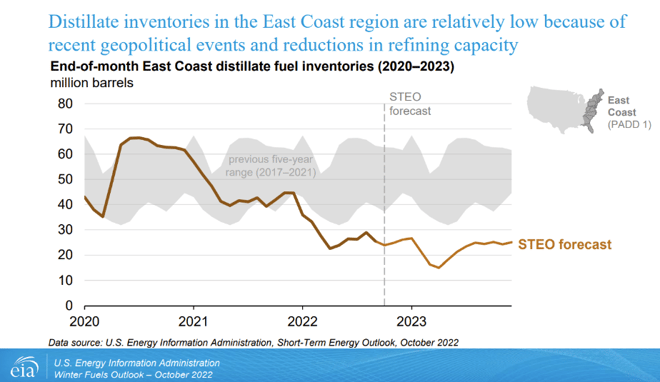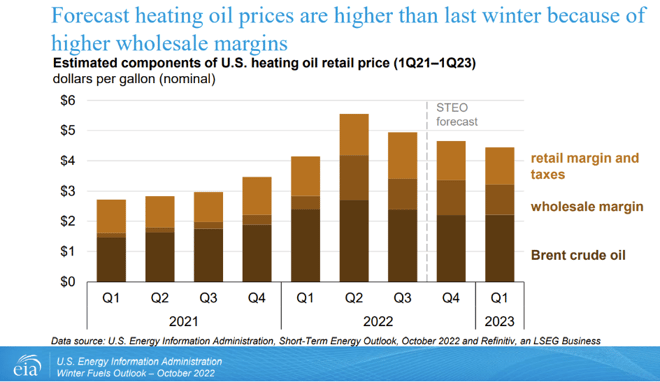How to Choose the Right Heat Pump Installer
We’ve heard from many people that they hope to install heat pumps or a heat pump water heater before the end of...
.png?width=2240&height=1260&name=High%20Heating%20Costs%20This%20Winter%20(1).png) The U.S. Energy Information Administration (EIA) released its annual Winter Fuels Outlook on Oct. 12, predicting that heating costs this winter will increase significantly. Natural gas heating in the Northeast is expected to increase by 23%. For households that heat with oil, you can expect to spend 27% more this winter than last. A combination of two factors is driving this winter’s trend: cooler weather and higher prices due to supply constraints.
The U.S. Energy Information Administration (EIA) released its annual Winter Fuels Outlook on Oct. 12, predicting that heating costs this winter will increase significantly. Natural gas heating in the Northeast is expected to increase by 23%. For households that heat with oil, you can expect to spend 27% more this winter than last. A combination of two factors is driving this winter’s trend: cooler weather and higher prices due to supply constraints.
 Geopolitics and reduced investments in refining capacity leave us starting the winter with lower stocks than in recent years, adding upward pressure on prices.
Geopolitics and reduced investments in refining capacity leave us starting the winter with lower stocks than in recent years, adding upward pressure on prices.
EIA expects temperatures this heating season to average about 5% colder than last winter. Higher demand caused by the colder temperatures will exacerbate the supply constraints we’ve seen all year. Northeast inventories of petroleum distillates in September were 57% below the five-year average. EIA attributes this low inventory to:
 Crude oil prices and, especially, wholesale margins shot up significantly during the volatile first months of Russia’s war on Ukraine.
Crude oil prices and, especially, wholesale margins shot up significantly during the volatile first months of Russia’s war on Ukraine.
High prices for natural gas will also exert pressure on heating oil prices if some electricity generators switch from burning natural gas to heating oil to power their turbines.
If you heat with oil, now is the time to call your dealer for a tune-up so your heating system runs as efficiently as possible. An efficient system uses less oil, especially important when prices are $4 or $5 per gallon like they are now. The longer you wait, the harder it will be to get an appointment.
Regardless of what heating source you have – gas, oil, or electricity – start saving funds now for your winter bills. You may be able to set up a budget plan with your oil dealer or utility, where you pay the same amount every month and the balance is reconciled at the end of the heating season. A budget plan spreads your bills out over several months, so you have a predictable monthly payment instead of getting huge bills over a couple of months.
For heating oil customers, a budget plan is not a cap or lock-in price. Year after year, members call us regretting that they switched away from our Heating Oil Service in order to take advantage of a “too good to be true” capped or locked-in price. These prices are calculated to ensure a dealer’s profit. Our member price changes daily, but over the course of the season, membership is a guarantee of money saved. Say “no” to caps or lock-in prices, unless you like to "bet against the house.”
With new federal funding for energy efficiency, this is a great year to take a look at your home and see if there’s anything you can do to reduce your heating needs. In addition to general energy-saving actions listed on our website at Saving energy | Green Energy Consumers Alliance, you can get a free Home Energy Assessment either in-person or virtually from Mass Save (866-527-7283), Rhode Island Energy (888-633-7947), or your municipal utility. The Energy Advisor who meets with you will be able to explain any ways they see to make your home more energy efficient, from adding insulation to weatherstripping doors and windows. They’ll give you free LED lightbulbs, power strips, and low-flow shower heads if you need them. You might also consider whether there are any less-used rooms in your home that you could close off and not heat as much as the rooms you regularly use.
Even if you’ve never applied for help with your energy bills before, it’s worth your time to see if you qualify this year. Some new energy efficiency incentives are designed to help households that earn as much as 150% of the Area Median Income – in Boston that's roughly $200,000 – so don’t assume you don’t qualify without checking with your utilities’ energy efficiency program.
You may also qualify for help with your heating bills if your household income is below these thresholds:
| Household of: | MA income up to: | RI income up to: |
| 1 | $42,411 | $34,039 |
| 2 | $55,461 | $44,512 |
| 3 | $68,511 | $54,986 |
| 4 | $81,561 | $65,460 |
| 5 | $94,610 | $75,933 |
| 6 | $107,660 | $86,407 |
Fuel Assistance or LIHEAP (Low-Income Energy Assistance Program) is funded by the federal government and may be augmented by state-allocated funding as well. You can apply for LIHEAP at your local Community Action Program (CAP) agency. Check these websites to see if you can apply online or have to apply in person:
Massachusetts: toapply.org/MassLIHEAP
Rhode Island: https://dhs.ri.gov/programs-and-services/energy-and-water-assistance-programs/energy-support-ri.
If you qualify for LIHEAP, you are also eligible for the Weatherization Assistance Program (WAP). If you’re a low-income renter or owner, and your heating system is old, WAP might completely pay for the cost of replacing it. Insulation also is 100% subsidized through WAP, so be sure to ask for a Home Energy Assessment through your CAP agency.
Utilities are required to offer discounted rates to income-qualified households. Call your electric and gas utility to find out if you qualify for its discounted rate. If you receive LIHEAP, you should be on the utility discount rate as well.
This winter will be harder than ever. Each year, we assist dozens of people who can’t afford to keep the oil tank full, thanks to your donations. If you can afford to help this year, visit greenenergyconsumers.org/giveheat.
We’ve heard from many people that they hope to install heat pumps or a heat pump water heater before the end of...
In the fight against climate change, figuring out efficient and clean ways to heat water for showers, laundry, and...
Comments